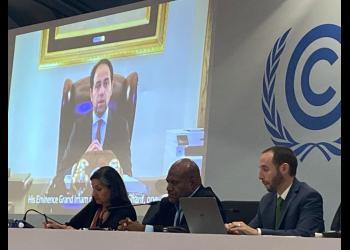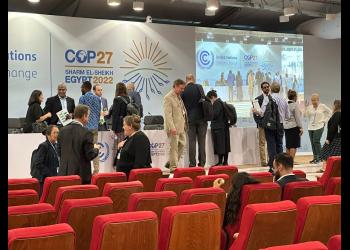Ethical responses to climate change: BIC COP 27 event features Al-Azhar, Religions for Peace and Vanuatu
Arabic translation here
Holistic means of addressing climate challenges, and particularly the role of religious communities and spiritual principles, were central to a Baha’i International Community (BIC) event hosted yesterday, organized in collaboration with Religions for Peace, the Anglican Communion, and the Buddhist Tzu Chi Foundation.
“Materialist development views … are incapable of achieving their main goal, namely, restoring development-related values in human consciousness and changing the daily attitudes of individuals and their life pattern through … compassion and shared social responsibility,” said Judge Mohamed Abdelsalam, Senior Representative of His Eminence Grand Imam of Al-Azhar and Secretary-General of the Muslim Council of Elders, in recorded remarks.
Titled “Realizing Ambition through Ethical, Intergenerational and Multisectoral Responses to Climate Crises,” the United Nations Climate Change Conference (COP 27) event featured nine speakers from a variety of geographic, sectoral, and religious backgrounds. Notable were ties that several speakers had to the Egyptian national context.
“I appreciated Judge Abdelsalam’s remarks about the significance of this conference being held in Egypt, which is at the heart of the Arab and Islamic world,” said Hatem El-Hady, Representative of the Baha’i International Community’s Cairo Office, in reflections after the event.
“All the speakers agreed that humanity can no longer afford to be held back by the shackles of history that divided us in the past,” El-Hady continued. “The urgent climate crisis has made it clear that the time has come for humanity to transcend all types of prejudices, especially religious prejudices, and to collectively learn to apply the values of coexistence, tolerance, and unity necessary for the common aim of protecting our environment.”
Many speakers emphasized the need for ecological interdependence to be reflected in political cooperation and collaboration. “Working together is critical, working together as one human family in a just and equitable world,” said Malcolm Dalesa, newly appointed Climate Attaché from Vanuatu to the United Nations Mission in New York.
“The fundamental thing we need is that critical and vital spirit of unity and a consultative manner, to ensure that there is long and sustained change,” Mr. Dalesa added.
The significant power of religious institutions to influence human behavior, and how that power is most constructively leveraged, was a central theme highlighted by Azza Karam, Secretary General of Religions for Peace. “The issue here, centrally, is: are religious actors of diverse kinds ready, willing, and able to work together,” Ms. Karam asked, “to actually pool their resources on concrete initiatives?”
The “Realizing Ambition” event joined a variety of other initiatives that BIC delegates, both international and drawn from the national Egyptian context, are undertaking at COP 27. In recent days, the BIC released an online resource entitled Working Toward One Planet and One Habitation: Sustainability and Environmental Efforts by Bahá’í Communities Around the World, as well as a 13-minute sustainability-themed documentary, entitled Tanna: A Study in Leadership and Action.



